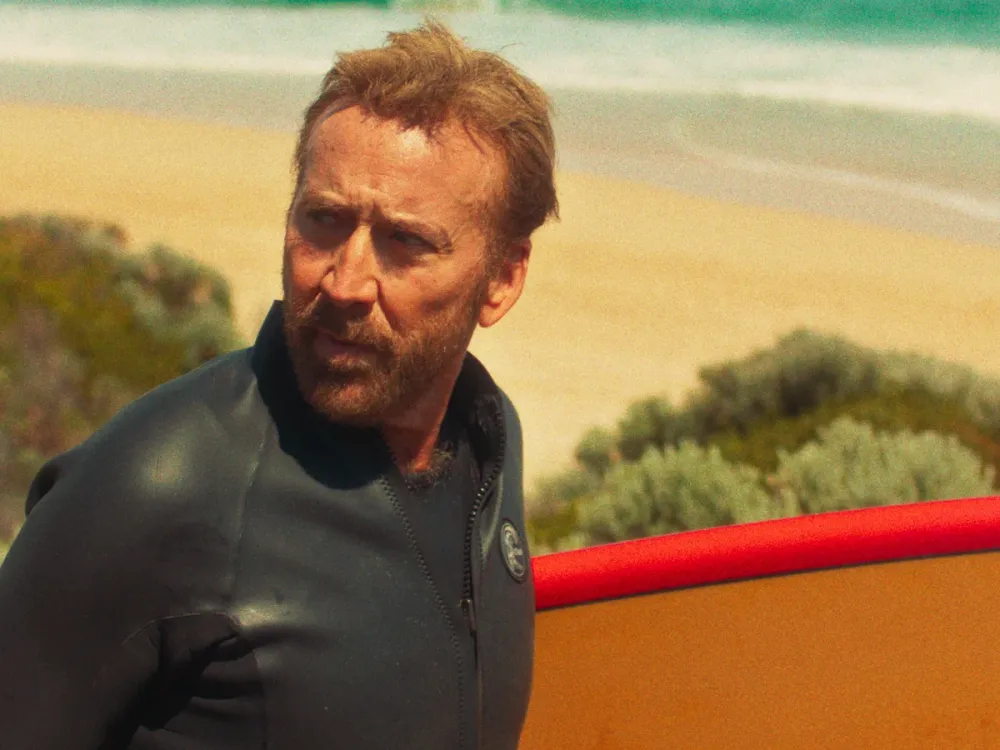The Surfer opens with a tense, slow buildup, but I couldn’t help but feel like I was watching a sloth move in slow motion rather than anything that kept me at the edge of my seat. The premise has potential — Nicolas Cage plays The Surfer, a man trying to reclaim a piece of his past by returning to Luna Bay, an idyllic Australian beach where he once lived with his teenage son. The goal? To purchase the house he once called home and repair their broken relationship. But the entire experience just felt like trudging through thick sand — an exhausting journey that doesn’t deliver any of the payoff you'd expect from a film like this.
From the very start, there’s something unsettling about the beach. It’s not just the surfers, led by the aggressive Scally (Julian McMahon), who seem to stake claim over the waves. It’s the entire atmosphere. The setting — a sterile, suffocating car park by the beach — feels like a metaphor for the protagonist's life. What once might have been beautiful and freeing is now contaminated by time, wear, and the relentless force of others. The Surfer isn’t just fighting for a home, but for a place in a world that’s no longer kind or welcoming to him. And as much as the movie tries to build this into an emotional struggle, it never quite gets there. Instead of feeling like a story of redemption, it feels like a relentless slog through the protagonist's life, where the pacing drags and the emotional payoff feels distant.
The Surfer draws clear inspiration from The Swimmer (1968), mirroring its exploration of fractured masculinity and the hollow promises of prosperity — this time within an Australian context. Like Burt Lancaster’s character, the protagonist in The Surfer wears the mask of a man who once had it all, only for that illusion to slowly unravel. However, where The Swimmer masterfully builds a sense of emotional collapse through its deliberate structure and momentum, The Surfer struggles to break free from repetition. Its story treads the same emotional ground without deepening its impact, leaving the journey feeling more stagnant than revelatory..
The film starts with a shiny Lexus, symbolizing his wealth and the remnants of his past glory, but as the movie progresses, even that fades. It turns into a dilapidated jalopy, a visual metaphor for how fragile his dreams are. As The Surfer faces off with the beach bums, who challenge him both physically and mentally, the film tries to deliver a message about how dreams are fleeting and life isn’t fair. But after a while, that message starts to feel worn out. The conflict with these characters is less of an intense, thought-provoking struggle and more of an ongoing distraction that feels disconnected from the deeper themes the film is trying to explore.
Nicolas Cage, as always, is compelling in his role, bringing a quiet desperation to the character. His performance is one of the few things that keeps the film from completely sinking. There’s a certain quiet despair in his portrayal that hints at the personal pain The Surfer is carrying, but even Cage’s efforts can’t save a script that lingers too long on slow moments. The film is definitely a slow burn, but there’s a point where the burn just feels like it’s dragging on too long. The slow descent into madness is inevitable, and watching it unfold, while well-acted, becomes exhausting. It’s not the catharsis we might expect, where the protagonist pulls himself up by the bootstraps and triumphs over adversity. Instead, it’s a drawn-out sequence of mental and physical decay that eventually loses its impact because the movie just keeps dragging it out.
There’s also a subplot about a missing teenager, which seems like it’s going to be a key part of the story early on, but it’s dropped so quickly that it feels like a wasted thread. The absence of any resolution to this subplot only adds to the feeling of aimlessness that pervades the film. The pacing, too, doesn’t help. There’s a lot of time spent in emotional limbo, with not enough happening to move the plot forward. And while I understand that the point might be to showcase how deep-rooted trauma can affect someone, it just becomes tiresome after a while.
The film does have moments that are intriguing in their disorientation. It’s almost as if the filmmakers intended for us to feel just as lost as The Surfer. But instead of providing clarity or some kind of emotional insight, it just ends up feeling like a confusing jumble. The climactic moment — a confrontation on the beach — holds some promise, but it’s over too quickly, leaving more questions than answers. And then there’s the strange, unexplained initiation into a secret society in the final act. It’s bizarre and puzzling, offering the hint of something more profound beneath the surface. But again, it’s left underexplored, making it feel more like an afterthought than a meaningful revelation.
By the end, The Surfer feels like a missed opportunity. There’s a sense that the film could have been something deeper, something more meaningful, but it never fully dives into the story or the character’s psyche. It just leaves you with that unsettling feeling, but not in a way that feels satisfying. Instead of being a poignant commentary on life and its complexities, the film just feels sluggish, drawn out, and ultimately unfulfilling. It tries to be profound, but in the end, it just doesn’t have the emotional weight or the narrative drive to make it memorable.
Director: Lorcan Finnegan
Cast: Nicolas Cage, Julian McMahon, Rahel Romahn
Writer: Thomas Martin
Producers: Nicolas Cage, Brunella Cocchiglia, Robert Connolly, Leonora Darby, James Grandison, James Harris, Nathan Klingher
Composer: François Tétaz
Cinematographer: Radek Ladczuk
Editor: Tony Cranstoun
Screening or Streaming Availability:

